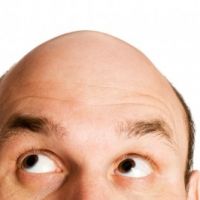Hair Loss
 Your hair loss may have started with a few extra hairs in the sink or in your comb. But now you can't look in the mirror without seeing more of your scalp.
Your hair loss may have started with a few extra hairs in the sink or in your comb. But now you can't look in the mirror without seeing more of your scalp.
What is it?
Baldness typically refers to excessive hair loss from your scalp and can be the result of heredity, certain medications or an underlying medical condition. Anyone — men, women and children — can experience hair loss.
Some people prefer to let their baldness run its course untreated and unhidden. Others may cover it up with hairstyles, makeup, hats or scarves. And still others choose one of the medications and surgical procedures that are available to treat baldness. Before pursuing any of these treatment options, talk with your doctor about the cause of and best possible treatments for your hair loss.
What causes it?
About 90 percent of the hair on most people's scalps is in a two- to six-year growth (anagen) stage at any given time. The other 10 percent is in a two- to three-month resting (telogen) phase, after which time it is shed. Most people shed 50 to 150 hairs a day. Once a hair is shed, the growth stage begins again as a new hair from the same follicle replaces the shed hair. New hair grows at a rate of approximately one-half inch each month.
Hair loss may lead to baldness when the rate of shedding exceeds the rate of regrowth, when new hair is thinner than the hair shed or when hair comes out in patches.
Other causes can include:
- Disease.
- Poor nutrition.
- Medications.
- Medical treatments.
- Recent high fever, severe flu or surgery.
- Infancy.
- Childbirth.
- Hair treatments.
- Scalp infection.
What are the symptoms?
Hair loss – temporary or permanately from areas of your scalp.
Are there any natural therapies?
- A multi-vitamin and mineral supplement is recommended to ensure you are getting all the nutrients necessary for healthy hair.
- The delicate balance of oils on the scalp is maintained by essential fatty acids; try supplementing your diet with Evening Primrose and Fish Oils to improve your hair health.
What else can I do?
For healthy hair and scalp, ensure that your diet is rich in fresh fruit and vegetables, especially leafy green vegetables, and that you are eating some protein every day.
If you are uncomfortable with your hair loss, quality hair pieces and wigs are available.
Did you know?
Your family and friends can be more sympathetic if they understand the cause of your baldness or your concerns about your looks. You may also learn that they are less concerned about changes in your appearance than you are.

Advanced Hair? No Need. Emed Gets to the Root of Hair Loss…
It is a moment many men dread – the barber asks if they want a haircut to help disguise their bald spot.
For women, it can be equally if not more distressing to realise they are losing their hair.
Emed looks at hair loss from all angles. Find out what you can do to regain your mane.





